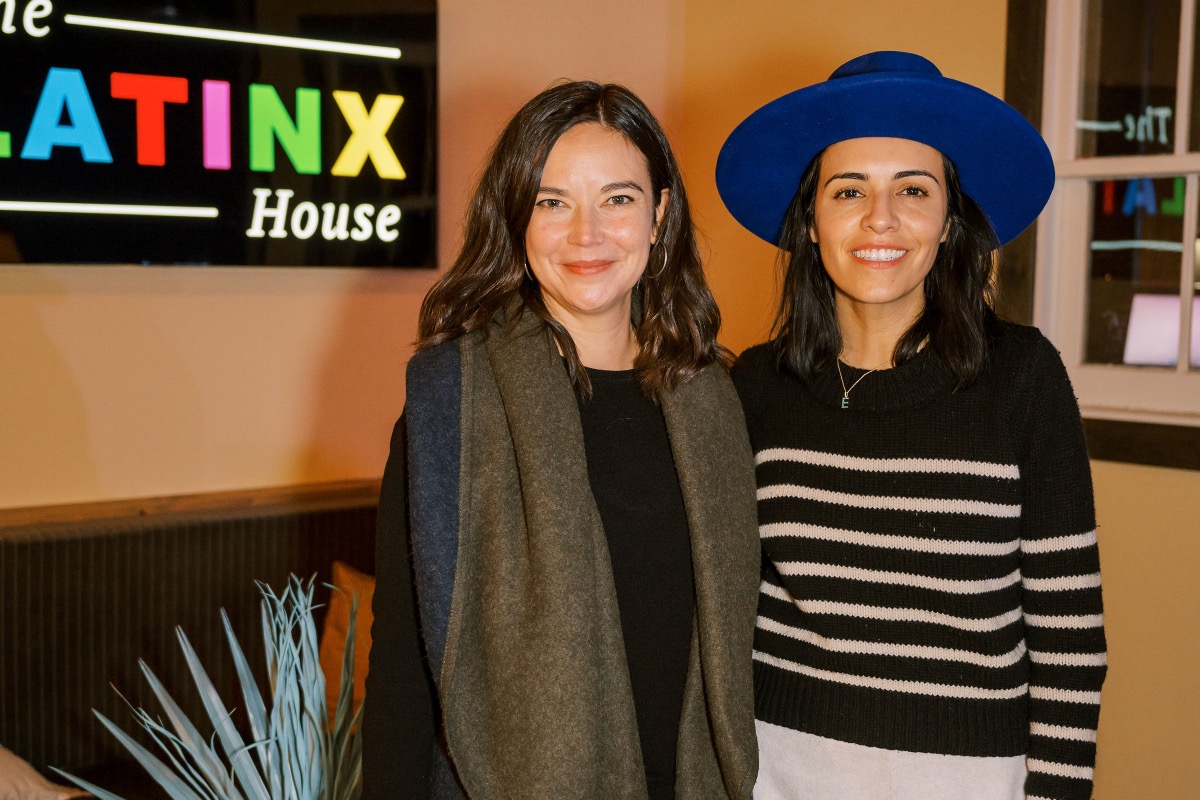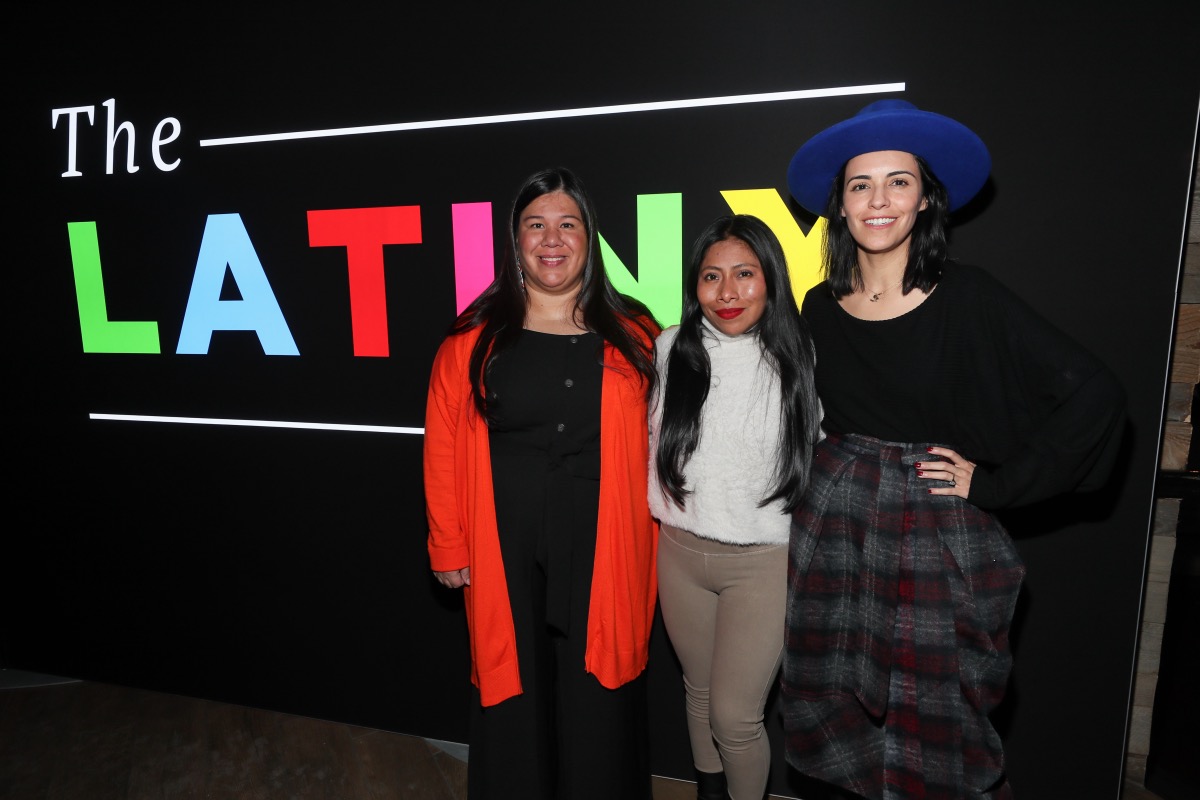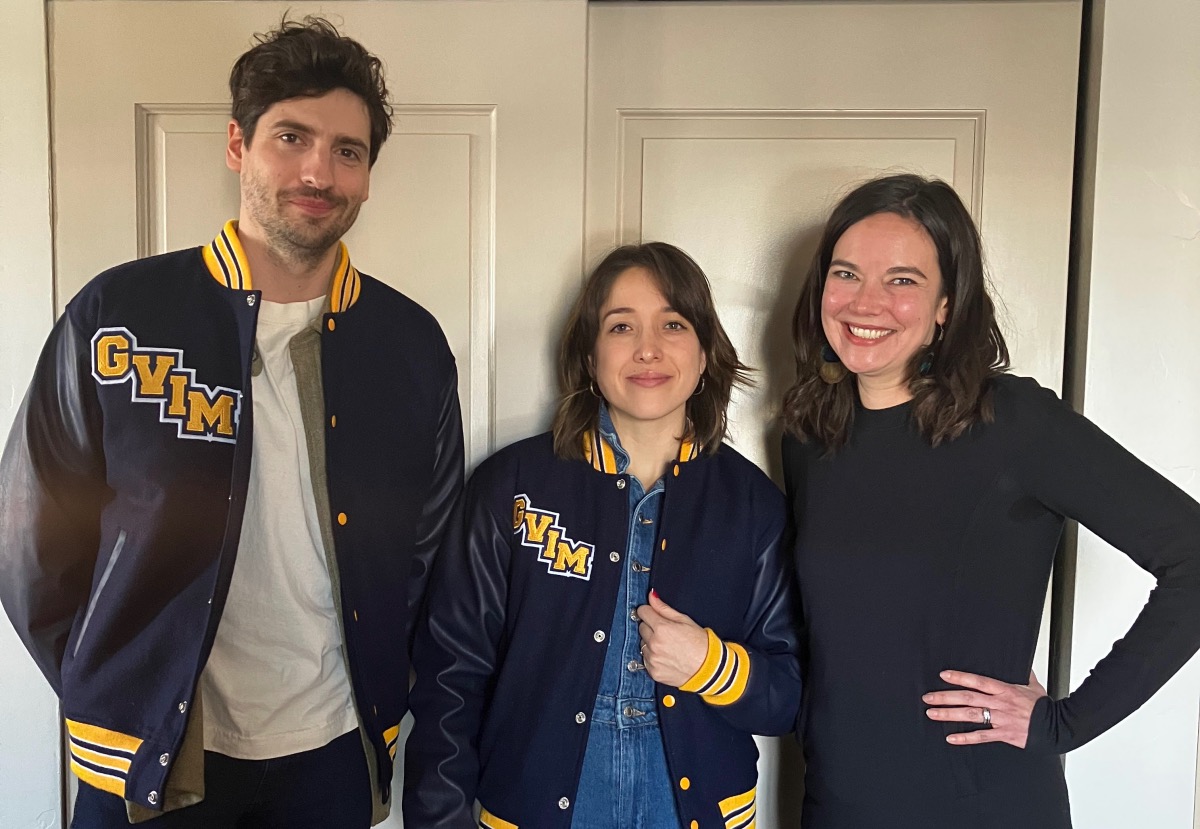

Latino Rebels’ entertainment correspondent Cristina Escobar, left, with producer and activist Olga Segura, co-founder of The Latinx House and Poderistas, at the Sundance Film Festival in Park City, Utah. (Danny Moloshok/Invision for The Latinx House/AP)
It’s possible to have an entirely Latinx Sundance Film Festival. I’m not going to say that I went 100 percent that way, but it was nice to have the option.
This year, there were 12 Latinx feature films, plus panels and launch parties. Several of the films won awards, with Eugenio Derbez’s Radical taking the Festival Favorite Award, Lío Mehiel in Mutt winning the U.S. Dramatic Special Jury Award for Acting, and Maite Alberdi’s The Eternal Memory taking home the World Cinema Documentary Grand Jury Prize.
The Latinx House, a nonprofit Latino advocacy group, set up at the top of Park City’s Main Street, a prime spot that placed its programming in the literal thick of the crowd. Stars of all sorts stopped by: I saw Tenoch Huerta (Wakanda Forever, Narcos), Yalitza Aparicio (Roma, Los Espookys), and Mishel Prada (Vida, Fear of the Walking Dead).
And that’s just the Latinx talent! I also spied Daniel Dae Kim from Lost, Emmy Award-winning actress and producer Karrueche Tran, and Emmy Award-winning TV creator, writer, and director Joey Soloway pop in for a drink or to say hello to The Latinx House founders Mónica Ramírez—a former Latino Rebels contributor—and Olga Segura.


Co-founders of The Latinx House Mónica Ramírez, left, and Olga Segura, right, pose with actress Yalitza Aparicio at the Sundance Film Festival on Saturday, January 21, 2023, in Park City, Utah. (Photo by Danny Moloshok/Invision for The Latinx House/AP Images)
It was an ambiance-rich escape from the whiteness outside, and by that I mean the cold, the snow, and, yes, aspects of the more general crowd. Building that safe space for Latinx people, other people of color and their allies fits the group’s goal.
“Our space is very inclusive,” Segura told me. “Everybody’s welcome.”
She recounted going to the festival first as an audience member and then with films and feeling lonely.
This is only The Latinx House’s second time at Sundance. Before that, Latin American and U.S.-based Latinx filmmakers had to figure out the festival and the film-buying system in isolation—and sometimes not at all. From her experience, Segura saw “the need for creating a space where we could, like, network and celebrate our films, and continue building magic.”
And that’s what The Latinx House is: a place where Segura can boast that Latinx films signed distribution deals, and where friendships and collaborations are born.
In the line to get in I met some of the team behind Rotting in the Sun and chatted with Latinx filmmakers at the bar inside (free drinks for all!). And while the introvert in me grew exhausted from all the socializing, The Latinx House was certainly a remedy for any imposter syndrome I brought with me.
I’m resisting the urge to be grateful for simply having been invited. Isn’t that what Latinas are often told? That we should be content simply to be let through the gates to glimpse the rarefied world of the rich and powerful? And there I was, my first time at the Sundance Film Festival—and as a credentialed member of the media no less. Can you blame me for feeling a bit intimidated?
Now, to be clear, everyone at the Sundance Institute was downright lovely to me. They gave me a full access pass as part of their Press Inclusion Initiative. They set me up with a cohort of fantastic writers, proactively offered advice (bring gloves to Park City!), and promoted my work.
📢 Announcing the 2023 Press Inclusion Initiative Cohort!
Follow the press selected in the thread below as they'll be posting about their Festival experience and favorites in the coming days! ⬇️ pic.twitter.com/lkjUyFTQjJ
— SundanceFilmFestival (@sundancefest) January 14, 2023
They rolled out the carpet for me, and their efforts to get more critics from underrepresented groups —a.k.a. anyone not male and pale— got me there. I am thankful.
But also, I know my work is valuable. To Sundance. To my community. To Latinx filmmakers. To me.
“Who are the people that give Sundance its legitimacy?” asked Favianna Rodriguez, co-founder and president of the Center for Cultural Power, which describes itself as “a national organization investing in artists and storytellers as agents of positive social change.”
“I was at the opening award ceremony,” she told me. “And I saw my friend Kamau Bell, and I saw Ryan Coogler, my friend Boots (Riley)… As Sundance has increasingly become more representative… we as people of color have to understand that it’s a symbiotic relationship and that we have to also demand the shifting of resources.”
She’s calling on white-led institutions like Sundance to take up less space, for more investment —in money, time, and attention— to go to “up-and-coming BIPOC-led grassroots film festivals.”
The New York Latino Film Festival and the Los Angels Latino International Film Festival come to mind, and I have to agree. What would a Sundance-level of attention and support mean for them? I bet it’d be transformative.
I want that, but I also want us to occupy spaces like Sundance, and so I was proud to see my community doing just that.
Before I arrived, I got added to a Latinx group chat, sharing film recommendations, party invites, and jokes. It started off at perhaps a dozen but was 75 people strong by the end of the festival as people added more of their contacts. That thread was how I knew Radical was striking a nerve with crowds, as everyone couldn’t stop talking about it.
That group also organized one of my favorite events, a crowded happy hour in a wine cave where everyone already had the camaraderie of the WhatsApp group to fall back on. Many went to the premiere of Puerto Rican director Kristian Mercado’s Mela, which premiered at Slamdance, a nearly 30-year-old film festival that runs at the same time and in the place as Sundance but rocks more of a bootstrap feel—instead of the high-production-value land-acknowledgment/climate-change video that Sundance aired before each film, Slamdance gave out a handful of stickers supporting Native climate activists and warning of the dangers of nuclear waste.
So, yes, we were building our own networks and showing up for each other.
And, thankfully, there was a lot to show up for. I saw great Latinx films across nearly every Sundance category, varying in tone and approach, and featuring stars of different races, sexualities, ages, genders, and more. A beautiful thing to behold.
U.S.-based Latinx filmmakers were still underrepresented, although we had strong showings in Going Varsity in Mariachi and Mutt. Is it perhaps easier to recognize a foreign filmmaker whose home country has invested in their talent than to change our own systems so that Latinx talent has equal access? I think so. And that’s why we need to keep pushing, keep building our own things, and keep taking up space in historically powerful institutions like Sundance.


Latino Rebels’ entertainment correspondent Cristina Escobar, right, with Sam Osborn and Alejandra Vasquez, co-directors of ‘Going Varsity in Mariachi’ (Cristina Escobar/Latino Rebels)
As Favianna Rodriguez broke it down: “I want folks to remember that we live in the country that exports the most stories in the world. We shape global culture. If voices of color are not part of that global culture, then we are going to continue to have a white supremacist colonial worldview that dominates.”
Power and culture are intertwined, and we have to keep working at claiming the power to create culture—and creating a culture that fosters our power.
Thankfully, if there’s one thing I learned as a Latina at Sundance 2023, it’s that our community is doing the work. We’re growing our numbers, getting loud, and organizing.
Segura called it “magic.” I call it progress.
***
A writer and activist, Cristina Escobar is the co-founder of latinamedia.co, uplifting Latina and gender non-conforming Latinx perspectives in media. She’s a member of the Latino Entertainment Journalists Association and writes at the intersection of race, gender, and pop culture. Twitter: @cescobarandrade


